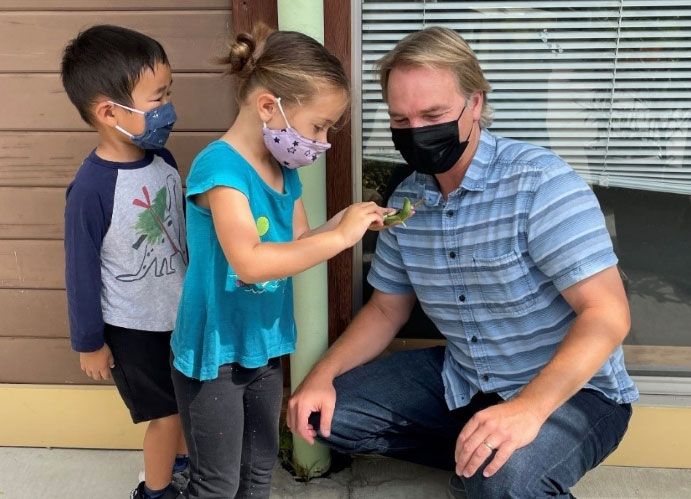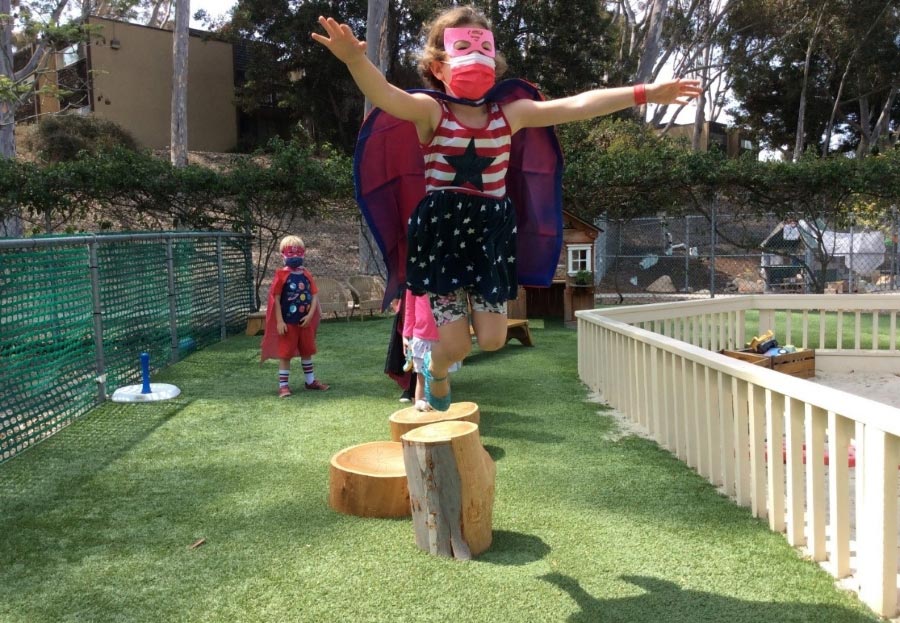By:
- Leslie Sepuka
Published Date
By:
- Leslie Sepuka
Share This:

Children share the discovery of a caterpillar with Matthew Proctor. Copyright/photo credit: UC San Diego.
Looking to the Future with the New Director of UC San Diego’s Early Childhood Education Center
For nearly 50 years, UC San Diego’s Early Childhood Education Center has provided high-quality care and education for the children of students, faculty and staff. Full- and part-time programs encourage the social, emotional, intellectual and physical development of young children ages three months to five years. Over the decades, the center has grown from one building to seven, evolving as the field of early education has evolved. We spoke to the new director, Matthew Proctor, about his vision for the Early Childhood Education Center.
As director, what is your vision for the Early Childhood Education Center going forward?
I studied Human Development at UC San Diego, and my first experience with the Early Childhood Education Center was my senior project. I then returned to work at the center as a teacher, lead teacher, center coordinator and eventually, the director. The Early Childhood Education Center curriculum is inspired by the Reggio Emilia philosophy of education focused on child discovery, with children as the initiators of learning. I can remember when the Reggio philosophy was first introduced to the center. It helps children to become more engaged and confident, because the children are initiating the learning. Through this, learning becomes meaningful and fun. In other words, rather than teaching math because it’s math time, you embed math, or literacy or science naturally into what the children are already interested in playing, what they are already discovering together.
With this approach, children, teachers and parents work together as a team and a community. These are key lessons for children in how to problem-solve, communicate and create with each other. In addition, wonder, imagination and creativity are highlighted and promoted through open-ended materials such as loose parts, natural and recycled materials and sensory opportunities with endless possibilities to manipulate their creative ideas and learning. Another important focus in our curriculum is nature. Research has shown that through nature, children thrive and learn. There are so many benefits of playing in a natural environment that foster children’s intellectual, emotional, social and physical development.
The Early Childhood Education Center understands the need to address important topics at an early age. Recently, we have come to realize that many topics of social justice (for example, race) are extremely important to address in early care and education as children’s beliefs are formed during this stage in life. The center’s kindness curriculum focuses on mindfulness and empathy, creating a foundation for understanding and practicing social justice. Our social justice curriculum is based on the National Association for the Education of Young Children’s four goals of anti-bias education, which are identity, diversity, justice and activism. The Early Childhood Education Center created this curriculum to be used as a starting point for conversations and activities that directly address social justice issues. Starting in February of 2021, the center highlighted each month a classroom’s implementation of the social justice curriculum. We will continue this through the next school year and beyond.
We also recently merged the centers to create one consistent experience, with one unified curriculum, waitlist and hours of operation. This helped to streamline practices and procedures and create cohesion, stability and consistency.

Wonder, imagination and creativity are highlighted and promoted at the Early Childhood Education Center. Copyright/photo credit: UC San Diego.
What should parents who are returning to their workplace after working remote consider?
Going back to work after being at home will be a difficult transition. But what we have learned since reopening is that children are resilient. It was evident the majority of children coming back wanted to be at school, learning and playing with their teachers and friends. The children have taught us about resiliency, adapting and flexibility. Having said that, there has been significant trauma through this pandemic. It is vital for parents, as they return to work, to engage their children in conversation. Talk about the positive aspects of school, about being with friends and learning from their teachers. Project positive and concrete details about what children will be doing, as it helps prepare them to go back to school. To help children returning to the Early Childhood Education Center, we set up meetings where parents can ask questions and children can meet the teachers and see the classroom. The Early Childhood Education Center website also includes a list of resources for parents with children at home.
Can you talk about the Early Childhood Education Center’s work with researchers on campus in understanding how children learn?
Over time, the Early Childhood Education Center has made connections with the department of education studies, human developmental sciences, cognitive science and others on research related to brain development, the way children learn, the capacity they have to learn, the impact of gender, different types of intelligence and more. We value being part of that collaboration. It’s important to always move our understanding forward, and to bring that awareness to the field. Recent research has shown that 90% of brain development is in first five years of life. This is significant, and it drives our work and that of the field.
The pandemic sparked a national discussion about where and how small children spend their days, and the impact it has on their development. It brought greater awareness to the impact of screen time and the benefit of being with teachers and other children in a program. Another thing to come out of the pandemic was the recognition that early childhood education is not accessible to all people. The national discussion around inequity, and how to make quality programs more accessible has been invaluable.
Part of my long-term vision is to advocate for the expansion of child care services to the students, staff and faculty on campus, and to show that high quality early education is an essential component of our campus community. The pandemic has shown that early care and education is an issue of equity and productivity, and when high quality care is available to all, the campus community benefits.
What would you like to share with current students who are Human Development majors?
The Human Development major was offered the year I started at UC San Diego. I was one of the first three graduates of the program. The strength of the program, then and now, is that it brings many disciplines together—philosophy, education, cognitive sciences, anthropology. My advice to students is to try different things. Also, they should get as many experiences as possible related to human and child development. That is where you find your passion. I did my student teaching in a third-grade classroom and then a kindergarten classroom. It was during my time in the kindergarten classroom that I realized I wanted to work with younger children, and I changed my career trajectory toward early childhood education. Spending time with young children can open your eyes, and is often the best lesson in how meaningful the work can be. We encourage students to apply for available positions online.
Share This:
Stay in the Know
Keep up with all the latest from UC San Diego. Subscribe to the newsletter today.



